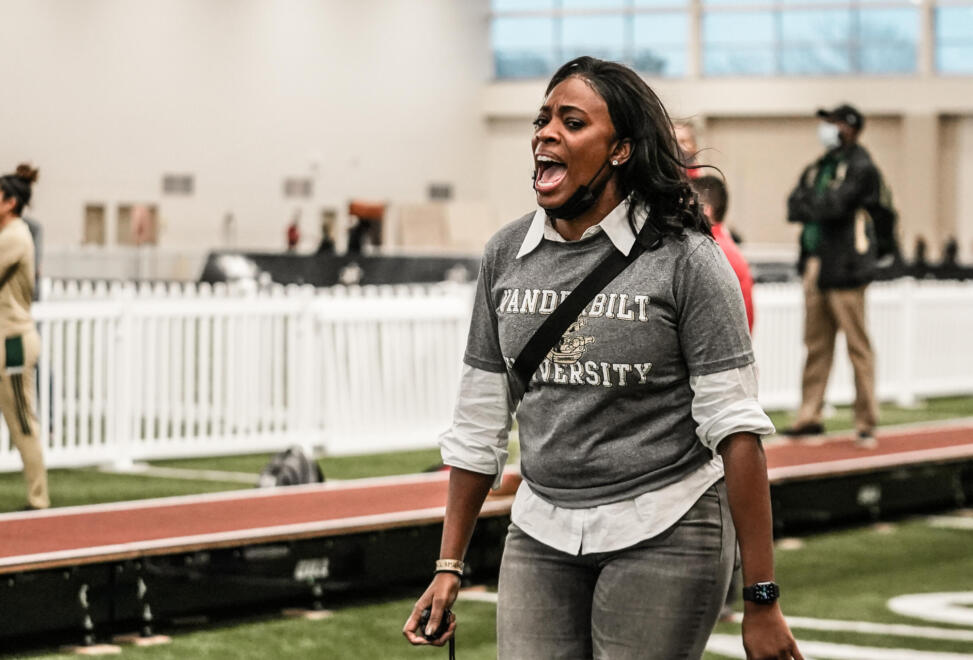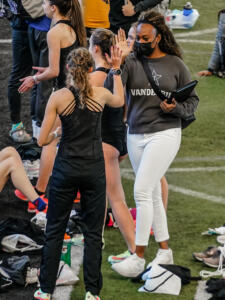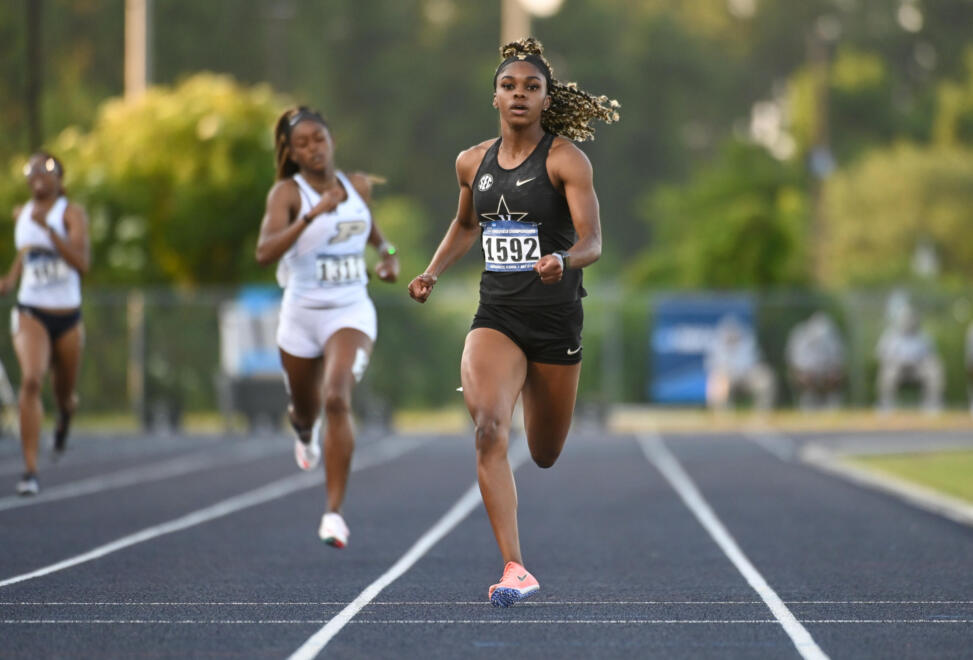Starting Blocks
by Graham HaysFor Vanderbilt's Althea Thomas, track and field has always been a way to lift up young people and strengthen a community.
NASHVILLE, Tenn. — From the explosive intensity of 100 meters to the toil of 10,000 meters, track and field tests the limits of individual excellence. Yet even in that world, the 400-meter hurdle event stands apart.
Take the longest sprint distance. Add 10 obstacles, each two and a half feet high, at regular intervals around the track. The race demands a unique combination of attributes: a sprinter’s speed, a distance runner’s endurance, and resolve and technical skill unlike any other event.
Growing up, Althea Thomas didn’t just accept that challenge. She craved it. She had to bargain with a high school coach to get to run the 300-meter hurdles for the first time (the race is so punishing that it is often shortened at the high school level): She could run the hurdles, the coach said, if she ran the 1,500 meters first. Lucky her. She loved it all the same. She loved it even more during summers, when she ran the full 400 meters with a local track club. Others wilted in that final stretch. She flourished.
“I lived for outworking other people and having that grit,” Thomas says. “I would come across really fast sprinters in high school who could run a really good 200 meters compared to me. Against them, the 300 hurdles would be a photo finish. But the moment I moved to 400 hurdles in the summer, it was no competition. That last 100 was where I lived.”
And she never assumed she got to the finish line on her own. Track is a stage for soloists—think the singular excellence of Wilma Rudolph or Allyson Felix. For Thomas, Vanderbilt’s director of track and field and cross country, the sport is also rooted in community. She learned from her dad that the sport is also about family and belonging. From her earliest jobs, she saw the sport’s potential to expand horizons. And at Vanderbilt, she saw an opportunity to build something special not despite the university’s mission but because it offered a blueprint. For Thomas, track and field is about a few seconds of speed and a lifetime of learning.
“The way my dad raised us was that we needed to do everything we could to maximize our potential and where we could go,” Thomas says. “But you always come back and you always try to bring someone with you. You always try to help the next little girl.”

"It feels like she’s a veteran who has been doing it a long time. I think she’s had the ability to be a director and lead for a lot longer than even she realizes.”
Vanderbilt associate head coach Ashley Kovacs
A coach’s daughter
Thomas sometimes jokes that she was supposed to be a tennis prodigy like Serena and Venus Williams, the superstar sisters born around the same time she was. Her dad, DeWitt Thomas, was an avid tennis player who named his daughter to honor Althea Gibson, the first Black tennis player to win any Grand Slam championship and, later, the first to win Wimbledon. But when the family moved to Birmingham, Alabama, shortly after Althea was born, DeWitt surveyed the chronically underserved youth sports community and decided track and field was the best way to reach the largest number of kids. Track didn’t require specialized equipment. It didn’t need expensive venues. Each person could find an event or distance that suited them.
In 1982, not too long before Richard Williams put a racket in his daughters’ hands, DeWitt founded the Bessemer Striders, a track club based in that city just south of Birmingham famed for its now largely defunct steelworks. The club, which still operates four decades later as the Alabama Striders, became a hub of the community—and the family.
Althea played many sports, but running was at the center of family life. She and her siblings ran with the Striders. They ran in races for charity causes. A Thanksgiving 5k was practically a prerequisite for a place at the holiday table.
“My introduction to track and field was being born, basically,” Althea says, laughing.
Only in recent years, long after she was old enough to rent a car or run for president, did she start saying “Dad” more often than “Coach Thomas.” Her Instagram handle, @coachesdaughtr, leaves little doubt about his influence. It wasn’t that he treated her more like an athlete than a daughter. It was that he treated all of the Striders as if they were family. Many summer nights the family home was crowded with extra sleepers—anything to make it easier or more likely that people could get to the track for practice or a meet the next day.
 Vanderbilt student-athletes and staff, who know the new boss as “AT,” also know her dad—who still gets his daughter in hot water when he calls in the middle of a supposedly phone-free practice to wish her student-athletes good luck. They know him as “Coach Thomas.”
Vanderbilt student-athletes and staff, who know the new boss as “AT,” also know her dad—who still gets his daughter in hot water when he calls in the middle of a supposedly phone-free practice to wish her student-athletes good luck. They know him as “Coach Thomas.”
“He’ll give us a good speech,” senior Taiya Shelby says. “We all love Coach Thomas too.”
DeWitt Thomas is a motivator, but he doesn’t stress getting to the finish line first. He motivates people to explore what exists beyond it. He didn’t ask 13-year-old Althea to speak to a group of even younger runners because it made them faster or she had any trenchant technical insights. He wanted them to see who they could become. And he wanted her to understand the influence she had.
Although working together for the first time, Thomas and Vanderbilt associate head coach Ashley Kovacs have been friends for years. They met in a diner before a college meet in Lexington, Kentucky. New to coaching at the time, Kovacs was venting her frustration about a lack of commitment from student-athletes. Amused as she ate at the nearby counter, Thomas introduced herself and counseled the former All-American thrower that she wouldn’t last long if she wanted everyone to be as driven as she was. But Thomas also told Kovacs that she loved hearing the passion for helping people improve. Over the years, as each made her way through the coaching profession, Kovacs got to know both generations of Thomas coaches.
“I knew from the very beginning when I met her that her dad was her person,” Kovacs said. “You can totally see where she gets it. She’s super-close with her whole family, but she and her dad have a special relationship. He was the person who shined the light for her—helped her realize what she could become and always knew the potential she had as an athlete but also as a leader. It is definitely a relationship that has defined her in a lot of different ways.”
Father and daughter often hit the road during the summers growing up, traveling to meets at college campuses around the country. They always ventured beyond the stadiums, too, whether exploring the Alamo’s history in Texas or the grandeur of Puget Sound on a trip to Seattle.
“Track opened my eyes and exposed me to avenues outside Birmingham,” Thomas says. “It showed me there was a lot out there to be seen and to experience.”
A community that challenges and supports
She nonetheless didn’t initially plan to enter the family business after she ran her final race as a standout student-athlete at LSU. After completing her degree and a stint as a graduate assistant for her alma mater, she returned to Birmingham and applied for a job teaching biology at Huffman High School, one of two high schools she attended. But when the school’s longtime Athletic Director Curtis Coleman spotted a familiar face during her interview process, he talked her into taking a position teaching health and coaching track, basketball and volleyball.
Huffman was a competitive powerhouse at the time, home to star athletes like the late Stanley Robinson, an NBA lottery selection, and NFL first-round selections Andre Smith and Marcell Dareus. Coleman told Thomas that it was important that students learn from someone who was an example of where athletic excellence could lead.
“We wanted to make sure that the culture was much like what we grew up in, having pride in your neighborhood, having pride in your school, having pride in how you carry yourself,” Thomas says of working alongside a cadre of friends and former classmates. “We tried to be the young teachers who could connect but who could also be good mentors.
“Even though I knew track and field had afforded me a lot of opportunities, it was really one of the first times I realized my experiences still weren’t that normal.”
In an alternate timeline, she might still be teaching and coaching high schoolers in her hometown. She enjoyed the work. But the administration soon changed, including Coleman’s departure. Without her mentor, she felt adrift and too much at the mercy of bureaucracy. In search of new challenges, she moved near friends in Massachusetts and took a job in sales. After two years in the 9-to-5 world, she moved home to Birmingham. She missed coaching.
Her dad was happy to have her help out with the Striders, but he worried about her pursuing coaching as a career. The profession was too unstable, too subject to the whims of those in power. But it was too late. He had set forces in motion all those years before by having her speak to the younger runners, by stressing the value of community and showing her that the starting blocks could launch a person on a journey that extended far beyond the finish line.
She saw all of that in action, and she wanted to share it with a new generation.
“We all kind of live in a bubble, whatever that bubble is,” Thomas says. “As a student-athlete at a Power 5 university in the SEC, you kind of live in a bubble. You don’t necessarily realize that not everybody thinks like you or has the people around who push you and motivate you that the sky is the limit.”
A perfect match for Vanderbilt
She traveled a typically itinerant coaching path from UAB to Kentucky, Purdue, Clemson and finally Georgia, where she was associate head coach and recruiting coordinator for one of the nation’s premier programs. She’s coached All-Americans and Olympians. It was only a matter of time until she had the opportunity to lead a program. Vanderbilt was the program she picked.
Exceptional track and field student-athletes have called Vanderbilt home over the years, from NCAA 400-meter hurdles champion Ryan Tolbert to All-Americans Simone Charley and Kristen Denk and current standout Shelby, who qualified for the NCAA Outdoors Championships a season ago. But sustaining excellence is difficult in a conference home to programs responsible for 22 outdoor and 18 indoor women’s team national championships and that stock Olympic rosters across vast swaths of the globe (the most recent Olympics saw 99 current or former SEC student-athletes compete in track and field events).
 Thomas knows all about the daunting standards of SEC track and field. As a student-athlete, she helped LSU add to the aforementioned championships. She did the same as a coach at Georgia. She chose Vanderbilt because she believes a school that exists to bring together the best and brightest in all fields can do more than produce talented soloists on the track.
Thomas knows all about the daunting standards of SEC track and field. As a student-athlete, she helped LSU add to the aforementioned championships. She did the same as a coach at Georgia. She chose Vanderbilt because she believes a school that exists to bring together the best and brightest in all fields can do more than produce talented soloists on the track.
“A lot of people think you can’t get accepted here,” Thomas says, running down the list of misconceptions she seeks to remedy. “A lot of people think there aren’t any resources. They think there are only science labs and debate teams. They don’t think we have a weight room or a track or equipment or staff. People just aren’t aware of how great Nashville is and how beautiful the campus is. They aren’t aware of the support and the people who are here.”
“Vanderbilt is an amazing university, and it’s an awesome place to run. We want to make it more visible and let people know it is available and it is an amazing option.”
There is power in showing people what it’s possible to achieve. She learned that early in life. Consider what that looks like in a new program. Thomas brought on Kovacs, whose world-class credentials include coaching her husband to a world title and Olympic silver medal. But even after signing on, Kovacs looked at a roster without even one returning thrower and felt the stress mount as she wondered how long the project would take.
What if they couldn’t convince people to share the vision, she asked Thomas.
They would, came the reply. Thomas asked her which recruits she felt strongest about.
“You think we’re just going to pick who we want and get who we want?” Kovacs recalls asking.
Yes, came the answer.
As the indoor season draws to a close, Kovacs has several talented student-athletes under her tutelage and another highly touted recruit on the way. The current group includes graduate transfer Divine Oladipo, an All-American who earlier this month broke the Vanderbilt shot put record and briefly set this season’s national standard in her first indoor meet.
“She doesn’t act like a first-year director,” Kovacs says of Thomas. “It feels like she’s a veteran who has been doing it a long time. I think she’s had the ability to be a director and lead for a lot longer than even she realizes.”

"There’s no way there’s any other school that would be better for me. It’s true, it’s the best of both worlds.”
Vanderbilt sprinter Taiya Shelby
The influence is no less evident on the talented student-athletes she inherited. In the first indoor meet, Haley Bishop set a school record in the 300 meters—one of three Commodores to better the previous mark in the race.
Shelby, an honorable mention All-American in the 400 meters a season ago, said returning student-athletes felt a strong culture already existed. Rather than start from scratch, they hoped a new director could mentor them as they took the next step—as a program and for individuals like Shelby, who hopes to improve on her strong junior season and compete professionally after her college career concludes.
An economics major and two-time U.S. Track and Field and Cross Country Coaches Association All-Academic honoree who will graduate this spring but has a remaining season of eligibility, Shelby wondered after the coaching change if transferring for graduate school might best serve her development. But she was intrigued enough by Thomas’ resume, and the caliber of student-athletes she developed at previous schools, to wait and see.
She immediately liked that Thomas not only asked student-athletes to write down their goals, on and off track, but then also sat down in one-on-one meetings and talked through how to achieve them. Former coach Steve Keith’s investment in growing the whole person had been key to her choosing Vanderbilt in the first place. It reassured Shelby to know that wasn’t changing. And as workouts began, she appreciated that Thomas always explained why they were doing things a certain way. It wasn’t just about going faster or getting stronger. It was about learning.
“It didn’t take much for me to know I was going to stay here,” Shelby says. “There’s no way there’s any other school that would be better for me. It’s true, it’s the best of both worlds.”
For Thomas, track and field has always been about creating a community in which excellence thrives—the kind of community that gives someone the confidence to take on any challenge, even the hurdles in the final 100 meters in one of the sport’s most grueling races.
The confidence to know that the finish line never marks the end of the journey.
“I’m a competitor. I love track and field,” Thomas says. “But the reality is track and field only lasts for so long, as long as your knees and hamstrings will allow. There’s a lot of life after that. The things you learn and how you apply those lessons are what is most important.”

